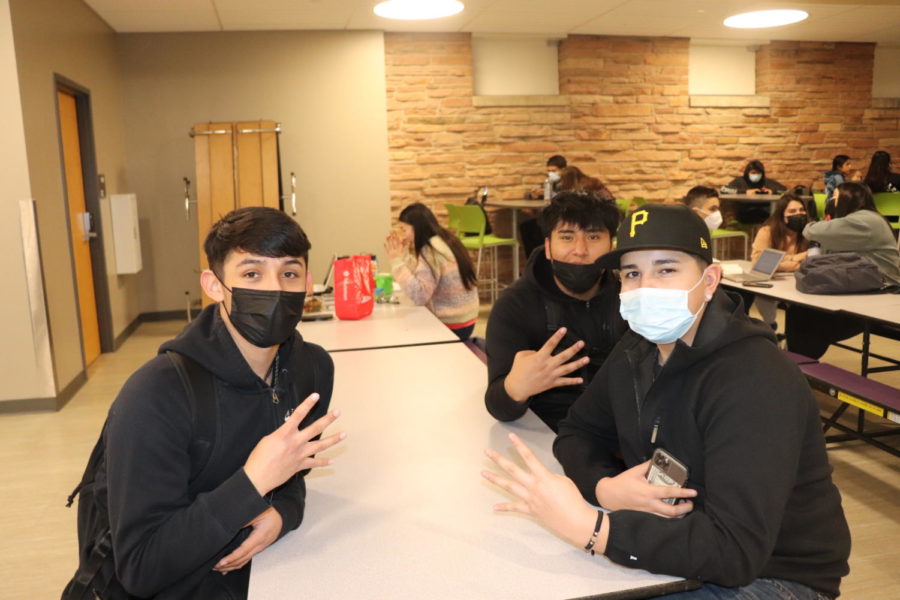Teens’ Mental Health
A Look at Poor Mental Health and Social Pressure
According to the U.S Department of Health and Human Services, your social ties with friends impact your mental, emotional, and even physical well being. Senior friends (Left to right) J.D Espinoza, Diego Castruita, and Eric Ivan Gonzalez give their mental health a boost during lunch.
In our world, little kids have endless opportunities for entertainment; they have their playgrounds and classes that engage them with art, finger painting, and other fun activities. Parents go above and beyond to make sure their child has something to do; they will set up playdates, take them to fun places and find babysitters. Making friends is also much easier as a little kid. Having all of that working with you makes it so much of a shock when we become teenagers.
Suddenly we are expected to entertain ourselves, make or get our lunches, and more. We have loads of homework, class becomes sitting through lectures and suddenly you have to worry about being “weird” or a “loner.” Wow. What a change from childhood. All of this change contributes to the poor mental health of teenagers, and it is causing so much social pressure, bullying and exclusion, only causing more mental health issues.
According to the World Health Organization, 1 in 7 teens ages 10-19 suffers from mental health issues, with 4.6% of 15 to 19-year-olds experiencing an anxiety disorder and 2.8% experiencing depression. For 13.6% of teens aged 15-19, they engaged in behaviors like alcohol and drug use. There is an idea with teenagers that everyone is supposed to act a certain way if they want to be accepted. When somebody has “differences,” not only do teens face bullying, but they can face exclusion as well.
So many people sit alone at lunch because teens cannot branch out from what is the same. This is where the social pressure piece comes into play, since not many people want the reality of sitting alone and being bullied. This is why a group of teens at Boca Raton High School started a lunch group called “We dine together.” So many people play the same game, which is to try to fit in in any way possible. Some women and sometimes men too will not eat much of anything and present other symptoms of eating disorders; In fact, 10 out of 100 women suffer from an eating disorder, AACAP. In addition, if people are making bad decisions at parties, quite a few teens will join in to be accepted by a community. Many individuals go to very far lengths to be accepted in other ways, like on social media. There are some trends that people do to be “cool” that can be dangerous and damaging to properties that some teens partake in for the likes. For example, the challenge of vandalizing school properties and videoing it for TikTok.
Today, adults are becoming more aware of this issue, and there are therapists, mental hospitals, and many other centers with professionals that can help. Although adults are becoming more aware and taking action to help, they will never be able to truly walk in our shoes as teens. Adult intervention will never be truly enough. Right now, teens need peers to understand them, and that is lacking.
Teens can be very confusing because we all want to be accepted for who we are. We all are beings who should empathize with others’ struggles and build each other up instead of bully and tease. But we do the opposite of that. Teens socially hurting teens is a mystery, and solving it would help teen mental health drastically.

Quinn Merrill is a sophomore at Boulder High School in Boulder, Colorado and enjoys doing sports. Some of those sports include ultimate frisbee, running, biking, CrossFit, and hiking. Quinn is part of the Boulder High ultimate frisbee team and is in her second year. She is also in the Boulder High Knowledge Bowl club and enjoys doing trivia with her 14-year-old brother and her mother at home. She also takes part in Sources of Strength and runs the community table, which has become a well-known event throughout the school. Other than sports and trivia, Quinn enjoys writing and doing art and does a lot of writing and artwork in her free time at home. She enjoys drawing mountains, nature scenes,...


